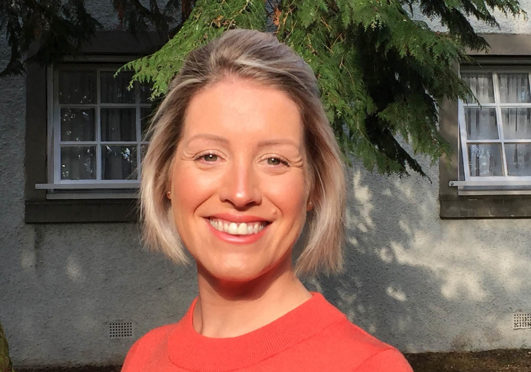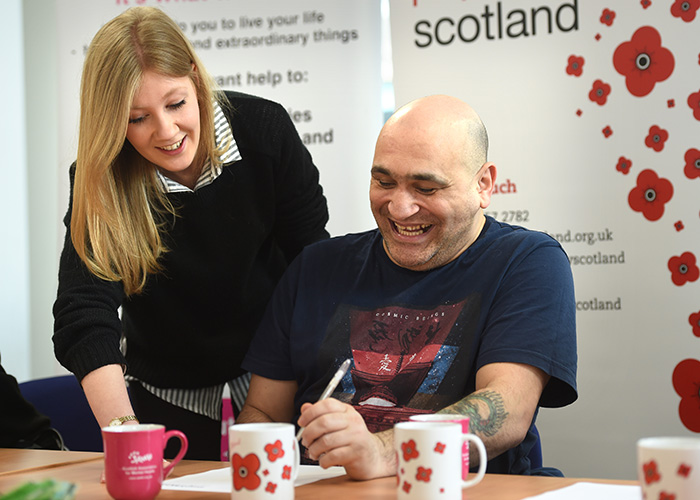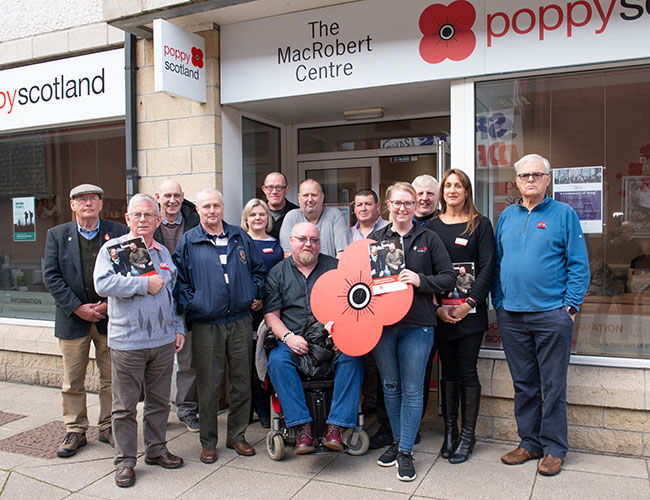Businesses may have closed and vital services may have stopped, but for Poppyscotland – which operates all year round – it is very much ‘business as usual’ particularly for its Welfare Services.
Of course, Poppyscotland has had to adapt and adjust (temporarily closing its welfare centres in Inverness and Kilmarnock and its staff working from home), but with social isolation at its height during this time, its services are needed more than ever.
To find out how the organisation is helping individuals who have served – or are still serving – in the armed forces, we spoke to Sharon Higgins, Deputy Head of Welfare Services (Welfare Support) at the charity. She manages a team of Welfare Support Officers and Independent Living Advisors who are based all over Scotland.
The Welfare Support Service team bring vast professional experience and varied skillsets and continue to provide support using the wonders of technology and take on new referrals.
Sharon said: “We have noticed so many people we support are coping really well in the current circumstances. They show such resilience, one of the key skills they learn in their armed services career.
“There are others who were struggling before and the restrictions in place due to Covid-19 is seriously compounding their situation, so we have increased the level of contact we have with them. Something as simple as a call to check on their wellbeing is what’s needed, as well as responding to any new emerging needs”
When Sharon joined Poppyscotland in 2013, it was the right role at the right time, as the previous year husband Steven was discharged from the army.
Sharon explained: “He served with the Royal Regiment of Scotland and was medically discharged in 2012. I am quite lucky, I describe my service life as pretty straightforward, although he had intense back-to-back operational tours in Iraq and Afghanistan.”
Sharon, Steven and their two children know first-hand the impact that support services have on families who are leaving the forces. A personal recovery officer from the Ministry of Defence supported them at their time of need. And now Sharon, who has a daughter, aged 12, and a 10-year-old son, is helping others in theirs.
Through Poppyscotland’s Welfare Support Service – which celebrates its first anniversary this month – Sharon and her team are providing much-needed support and guidance as well as accessing other services via Poppyscotland or partner organisations.
She explained: “Before I joined Poppyscotland, I was aware of what they did in terms of the Poppy Appeal, but I did not know they had a welfare offering. Managing the Welfare Support Service, I see first-hand the support that we can provide, vital support that is making a real difference to the lives of many people.”
Individuals come to Poppyscotland often with multiple, complex needs, ranging from struggles with social isolation to mental and physical health issues and Sharon and her team have an important role to play in helping these people access the most appropriate services and practical support for their needs.
However, as Sharon points out, social isolation and/or mental illness can strike at any time, whether you have served in the armed forces or not.
She added: “It is important to recognise that a relatively small but significant minority will experience depression, PTSD and other mental illnesses after service, but a lot people will have these throughout their lives, like everybody else. It is also important to realise that there are support services, like Poppyscotland, out there to support them.
“Whilst we are socially isolating right now, the prospect for some is even more difficult whether it be such a vast removal from how they would normally live their lives, to carers who are supporting family and loved ones and who depend on a social aspect of their life for a breather.”
The Welfare Support Service team provide much needed support and guidance to the armed forces community, to live with their mental health and other needs.
Sharon continued: “The Welfare Support Service team engage with individuals to prioritise their needs giving them practical support and sound guidance that empowers them to become self-sufficient.
“When I set up this service, I wanted people to understand Poppyscotland is present in every community in Scotland, whether it be a member of my team, our fundraising team or our volunteers, who are everywhere.
“We are currently spending more time in our communities and it may not be you who needs support but perhaps someone you know – we want you to know that we are here.”

Poppyscotland transforms lives all year round
The annual Scottish Poppy Appeal is only the starting point for Poppyscotland’s year-round work, with the money raised used to support ex-service personnel and those still serving at times of crisis in every aspect of their lives – from retraining and finding employment, to assessing the needs of disabled veterans and providing specialist equipment to help them live independently.
Sharon’s team of four welfare support workers and two independent living advisers working with Poppyscotland across the country to provide veterans with help that is tailored to their unique situation and can include funding for household provisions, respite breaks, and accessing healthcare and counselling.
Sharon explained how the need for services has increased and what Poppyscotland is doing to assist: “When the Welfare Support Service team identify someone who is struggling, we try to identify other possible referral routes for befriending or more specialist services such as Admiral Nursing which supports people caring with someone who has dementia.”
*If you, or someone you know, may benefit from the vital services that Poppyscotland provides for the ex-armed forces community, call them on 0131 550 1557 or visit the website by clicking here.


